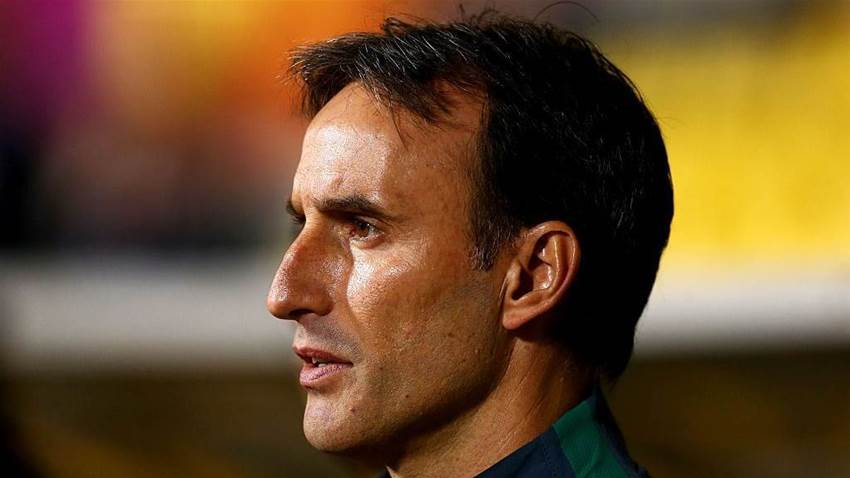Following Darije Kalezic's decision to leave Wellington, Aurelio Vidmar appears top of the Nix list. But can anyone rise Phoenix from the ashes?
As another dismal season envelops the embattled New Zealand club, there were few surprises as the side quietly announced Kalezic's impending departure today.
After four wins from 21 matches this season and home attendances dropping as low as 5,000 people, there wasn't much left to say.
“Head Coach of the Wellington Phoenix, Darije Kalezic, wishes to announce that he will not be continuing as Head Coach of the club next season,” Wellington's statement read.
“The parties were not able to find a mutual agreement on how to proceed forward and because of this have decided to move in separate directions.
“Darije wishes the best for the Club and fans in the seasons to come.”
The Nix's future looks bleak. The atmosphere around the empty yellow fishbowl that Westpac Stadium's become has rarely seemed more ominous for Kiwi football.
Not even a spirited performance against world no. 10 Peru - pushing the South Americans until the end in the All White's World Cup qualification battle - could cause a stir among the disinterested Wellington public.
As Wellington slumped towards the bottom of the table, criticism came hard and fast. Former Socceroo John Kosmina was quick to jump on the ditch the Nix bandwagon, calling for the club to lose its A-League licence.
“I have to be harsh and say I think it’s time to say goodbye to Wellington," he said.
“Now I look at it from our development point of view: take Wellington out and put another Aussie team in instead. It will benefit our game a lot more.”
Over Wellington’s ten-year history, they’ve made the finals four times but never finished above fourth in the league and third overall.
Phoenix also have the lowest attendance in the competition, averaging 6,182 people per game. Against Melbourne City earlier this season, they only registered 5,105.
Yet, as with every Phoenix season, there had been moments of optimism.
To kick-off the new year, Wellington secured two draws, a win and a loss; the defeat a closely fought contest against Melbourne City, in which Phoenix had 23 shots on goal.
Kalezic also appeared to recruit aptly in the summer, with the sudden departure of Dario Vidosic failing to further destablilise the club.
Nathan Burns returned across the ditch, while Serbian signing Matija Ljujic wasted no time proving himself by scoring a thunderbolt equaliser against the Wanderers. More recently, 18-year-old Kiwi youngster Sarpreet Singh announced himself in similar circumstances.
Under the reserved guidance of Kalezic, however, any momentum appeared quashed before it begun. Natural selection eventually claimed its man, but it's probably not done yet.
So who could the Nix choose to prevent social darwinism claiming their entire club? Enter, Aurelio Vidmar.
New Zealand media has reported that Wellington were already in talks with the 51-year-old before confirming Kalezic's departure, as the club recognised the need for contingency plans to ensure their future.
A favourite son of both the Socceroos and Adelaide United, Vidmar is a departure from the Nix mantra.
The A-League's 2008/09 Coach of the Year posseses a large, outspoken persona in stark contrast to his predecessor. His record at Adelaide United, however mixed, was one of strong recruitment and physical prowess - two of Wellington's biggest weaknesses in the recent past.
He led an unfancied Adelaide side to a pioneering Asian Champions League final in 2008, while his playing experience across Spain, the Netherlands and Japan - in addition to his international coaching experience with Australia - gives him some pedigree in approaching the role.
But is Vidmar really the right man for the job, or another quick fix for a long-term problem?
His winning percentage of 37% at the Reds fails to deliver confidence, as does his failure to qualify for the Rio Olympics with the Olyroos, or his short spell at Thai club Bangkok Glass, where he departed in circumstances rumoured to be less-than-pleasant.
Again, the Socceroos legend who once joked about "beheading" his players proved a little -larger-than-life for coaching. Intermittent success, pockmarked by controversy is hardly a recipe for survival.
Sure, at a Thai club that's run through 16 managers in 10 years, perhaps he deserves to be cut some slack.
But at the moment, whether Wellington Phoenix is any more of a stable, successful outfit than a mid-table Thai club is an uncertain proposition in itself.
Related Articles

Phoenix snare versatile Japanese forward Hideki Ishige

Phoenix raise concerns over Paulsen's Auckland move













